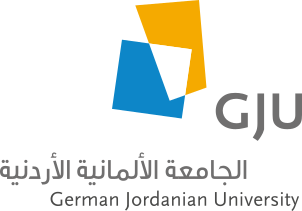German Jordanian University
Topic: Organization
 From HandWiki - Reading time: 3 min
From HandWiki - Reading time: 3 min
[ ⚑ ] 32°1′32″N 35°52′38″E / 32.02556°N 35.87722°E
الجامعة الألمانيه الأردنية | |
 | |
| Type | Public |
|---|---|
| Established | 2005 |
| Undergraduates | 2,801, 41% female[1] |
| Location | Near Amman , Jordan |
| Nickname | GJU |
| Website | http://www.gju.edu.jo/ |
German-Jordanian University (GJU) is a prestigious public university located near Madaba, Jordan. It offers more than 20 programs to over 6,000 students, primarily from Jordan and the Middle East. The curriculum differs from other Jordanian universities, with German language courses offered as preparation for the fourth academic year at a university of applied sciences in Germany and an introduction to German industry through an obligatory internship within the framework of the study program.
History
GJU was founded on April 25, 2005 by royal decree, in accordance with a memorandum of understanding between the Ministry of Higher Education and Scientific Research of the Hashemite Kingdom of Jordan and the Federal Ministry of Education and Research of the Federal Republic of Germany. In August 2004 a founding committee, in close cooperation with Jordan's Ministry of Higher Education and Scientific Research, began its activities in Jordan. The university's programs are designed to encourage the training of young professionals to move back and forth between Europe and the Middle East.
Financial support
GJU receives funding from the German government, with additional contributions from the State of Saxony-Anhalt and the Magdeburg-Stendal University of Applied Sciences, Germany.
Schools and programs
School of Applied Technical Sciences
- B.Sc. Industrial Engineering
- B.Sc. Mechatronics Engineering
- B.Sc. Mechanical And Maintenance Engineering
School of Natural Resources Engineering and Management
- B.Sc. Energy Engineering
- B.Sc. Water and Environmental Engineering
School of Applied Medical Sciences
- B.Sc. Biomedical Engineering
- B.Sc. Pharmaceutical Chemical Engineering
- M.Sc. Vision Rehabilitation
School of Management and Logistic Sciences
- B.A Management Sciences
- B.Sc. International Accounting
- B.Sc. Logistic Sciences
School of Computer Engineering and Information Technology
- B.Sc. Computer Science
- B.Sc. Computer Engineering
- B.Sc. Communication Engineering
School of Architecture and Built Environment
- B.Sc. Architecture
- B.Sc. Architecture and Interior Architecture
- B.A. Design and Visual Communication
- M.Sc. Spatial Planning
- M.Sc. Architectural Conservation
School of Languages
- B.A. Translation: German-English-Arabic
- B.A. German and English for Business and Applied Studies
- M.A. German as a Foreign Language
- M.A. Translation: German-English-Arabic
Talal Abu-Ghazaleh Graduate School of Business
- Master of Business Administration (MBA)
German Fachhochschulen (universities of applied sciences) model
In cooperation with the Magdeburg-Stendal University of Applied Sciences, the project team joined about 70 German universities of applied sciences into a consortium. Its members design the study programs' curricula, recruit qualified German academic staff and host German students during their year. The consortium is open to additional German-language universities of applied sciences.
The five-year study programs at GJU will follow the model of the German Fachhochschulen (universities of applied sciences), with their philosophy of industry-based practice and an application-oriented approach to knowledge. A large percentage of German professors comprise the academic staff, and courses in German and English as a foreign language are offered to encourage fluency. After an initial phase in English, program courses are taught predominantly in German. Regional studies and cross-cultural communication are also part of the curriculum.
Future plans
Plans for a new campus in Madaba, designed to help people with special needs, are underway. When complete, the Madaba campus will accommodate 5,000 students.
Notable alumni
- Maha Ali, current Jordanian Minister of Industry, Trade and Supply.
References
References
 KSF
KSF